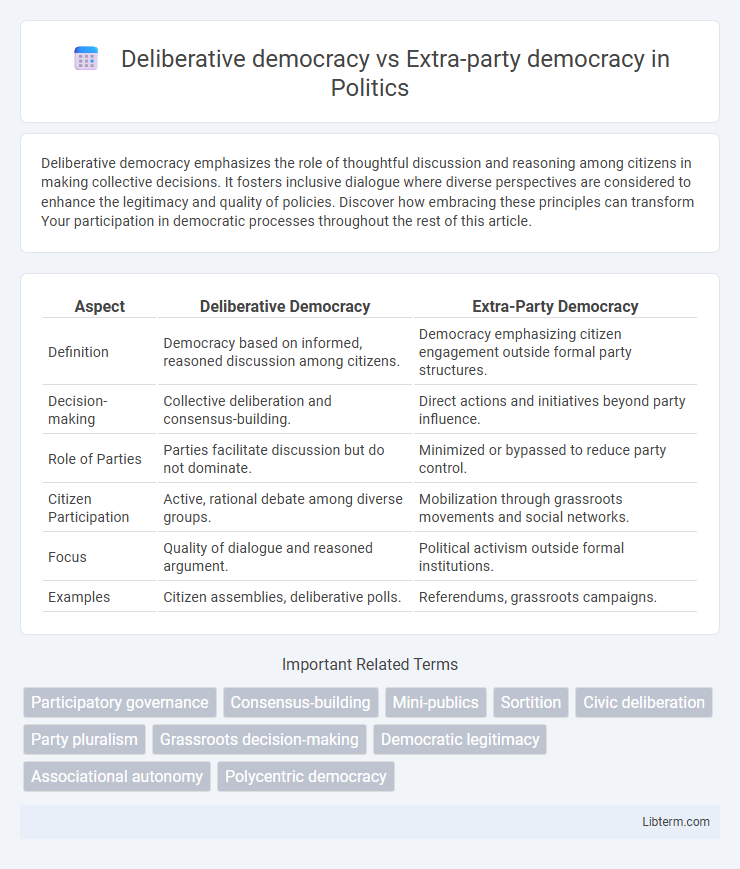Deliberative democracy emphasizes the role of thoughtful discussion and reasoning among citizens in making collective decisions. It fosters inclusive dialogue where diverse perspectives are considered to enhance the legitimacy and quality of policies. Discover how embracing these principles can transform Your participation in democratic processes throughout the rest of this article.
Table of Comparison
| Aspect | Deliberative Democracy | Extra-Party Democracy |
|---|---|---|
| Definition | Democracy based on informed, reasoned discussion among citizens. | Democracy emphasizing citizen engagement outside formal party structures. |
| Decision-making | Collective deliberation and consensus-building. | Direct actions and initiatives beyond party influence. |
| Role of Parties | Parties facilitate discussion but do not dominate. | Minimized or bypassed to reduce party control. |
| Citizen Participation | Active, rational debate among diverse groups. | Mobilization through grassroots movements and social networks. |
| Focus | Quality of dialogue and reasoned argument. | Political activism outside formal institutions. |
| Examples | Citizen assemblies, deliberative polls. | Referendums, grassroots campaigns. |
Introduction to Deliberative Democracy
Deliberative democracy emphasizes inclusive dialogue and reasoned debate among citizens to achieve informed decision-making and collective agreements. It prioritizes transparency, equal participation, and argument-based consensus, distinguishing itself from extra-party democracy, which relies more on movements and individual initiatives outside traditional party structures. This approach seeks to enhance legitimacy and public trust by fostering a culture of deliberation and reflexive citizenship.
Defining Extra-party Democracy
Extra-party democracy refers to a political system where decision-making and governance occur outside traditional party structures, emphasizing direct citizen participation and grassroots involvement. This model contrasts with deliberative democracy, which centers on informed, reflective dialogue within institutional frameworks, often mediated by political parties. In extra-party democracy, mechanisms such as referenda, citizen assemblies, and popular initiatives enable individuals to influence policies without relying on party intermediaries, fostering greater political pluralism and decentralization.
Core Principles of Deliberative Democracy
Deliberative democracy centers on inclusive, reasoned dialogue where citizens engage in informed discussion to shape public decisions, emphasizing transparency, equality, and mutual respect. Core principles include reflective judgment, where participants consider diverse perspectives, and legitimacy derived from reciprocal deliberation rather than mere voting outcomes. This contrasts with extra-party democracy, which often bypasses formal party structures, prioritizing mobilization and direct action over structured, rational discourse.
Key Features of Extra-party Democracy
Extra-party democracy emphasizes direct citizen participation without reliance on traditional political parties, fostering inclusive decision-making through mechanisms like referendums, citizen assemblies, and popular initiatives. It prioritizes transparency, accountability, and grassroots engagement to empower individuals beyond party constraints, enabling more diverse representation of societal interests. Key features include decentralized governance, open dialogue platforms, and institutional designs that facilitate continuous public input in policy formulation and implementation.
Historical Evolution of Both Models
Deliberative democracy evolved from ancient Athenian practices emphasizing public reasoning and consensus-building, gaining prominence in the late 20th century as a response to elite-driven decision-making. Extra-party democracy emerged in the early 20th century, particularly in Latin American and post-colonial states, where political participation operated outside traditional party structures to counteract party elitism and authoritarianism. Both models reflect distinct historical trajectories: deliberative democracy prioritizes inclusive dialogue and rational deliberation, while extra-party democracy emphasizes mobilization beyond formal party mechanisms to broaden political engagement.
Advantages of Deliberative Democracy
Deliberative democracy enhances decision-making quality by promoting informed and reflective discussions among diverse participants, leading to more legitimate and accepted outcomes. It fosters greater civic engagement and accountability through inclusive dialogue, ensuring that minority voices are considered alongside majority opinions. By prioritizing reasoned debate and transparency, deliberative democracy can reduce polarization and improve public trust in democratic institutions.
Strengths of Extra-party Democracy
Extra-party democracy excels in promoting political diversity by enabling a wider range of voices and interests outside conventional party structures to influence governance. This model enhances citizen engagement through direct participation mechanisms, fostering a more inclusive and responsive political process. Its flexibility in accommodating unconventional forms of political expression often leads to innovative policy solutions and greater adaptability to social changes.
Challenges and Critiques of Each System
Deliberative democracy faces challenges related to the potential exclusion of marginalized voices due to unequal access to resources and the complexity of sustained, rational discourse among diverse participants. Extra-party democracy is critiqued for its tendency to foster factionalism and reduce accountability, as the absence of structured party systems can lead to fragmented policymaking and difficulty in achieving coherent governance. Both systems struggle with balancing inclusiveness and efficiency, with deliberative democracy risking elitism and extra-party democracy confronting instability and weakened institutional legitimacy.
Comparative Analysis: Deliberative vs Extra-party Democracy
Deliberative democracy emphasizes inclusive, reasoned debate among citizens to reach consensus on policy decisions, promoting transparency and public reasoning. Extra-party democracy, in contrast, reduces the role of traditional political parties, often relying on direct citizen participation and alternative representation mechanisms to influence governance. Comparative analysis reveals that while deliberative democracy fosters structured dialogue and legitimacy through collective reasoning, extra-party democracy aims to bypass party constraints, enhancing pluralism but sometimes sacrificing systematic deliberation.
Future Perspectives and Practical Implications
Deliberative democracy emphasizes inclusive dialogue and reasoned debate among citizens to enhance legitimacy and decision quality, promoting transparency and mutual understanding in governance processes. Extra-party democracy, characterized by political participation outside traditional party structures, fosters grassroots engagement and challenges established political elites, potentially revitalizing democratic representation. Future perspectives highlight integrating digital platforms and hybrid models to balance deliberative depth with broad-based mobilization, while practical implications involve designing institutional frameworks that accommodate diverse participation modes without sacrificing coherence or effectiveness.
Deliberative democracy Infographic

 libterm.com
libterm.com